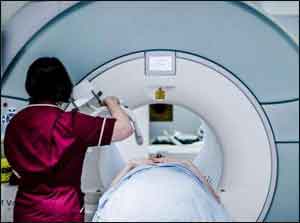- Home
- Editorial
- News
- Practice Guidelines
- Anesthesiology Guidelines
- Cancer Guidelines
- Cardiac Sciences Guidelines
- Critical Care Guidelines
- Dentistry Guidelines
- Dermatology Guidelines
- Diabetes and Endo Guidelines
- Diagnostics Guidelines
- ENT Guidelines
- Featured Practice Guidelines
- Gastroenterology Guidelines
- Geriatrics Guidelines
- Medicine Guidelines
- Nephrology Guidelines
- Neurosciences Guidelines
- Obs and Gynae Guidelines
- Ophthalmology Guidelines
- Orthopaedics Guidelines
- Paediatrics Guidelines
- Psychiatry Guidelines
- Pulmonology Guidelines
- Radiology Guidelines
- Surgery Guidelines
- Urology Guidelines
MRI associated with high response rates in radiation therapy in endometrial cancer, a study

Magnetic Resonance Imaging (MRI) shows high response rates in radiation therapy for medically inoperable endometrial cancer, revealed a study published in the journal Brachytherapy.
The study showed that MRI is associated with high response rates in radiation therapy (RT) with brachytherapy or brachytherapy (BT) + pelvic RT (PRT).
The study outlined the association between MRI response to RT and clinical outcomes as many patients with endometrial cancer cannot undergo cancer surgery and instead receive definitive radiation therapy (RT). The study assessed the performance of MRI in post-radiotherapy diagnosis.
Women with inoperable, clinical Stage I endometrial cancer were treated with definitive brachytherapy (BT) with/without pelvic RT (PRT). Patients underwent MRI with functional diffusion-weighted imaging before and after RT. A radiologist retrospectively classified cases as a complete, partial, or indeterminate response (CR, PR, or IR, respectively) vs. disease progression. Local control was clinicopathologically defined.
From 2007 to 2017, 50 women underwent definitive RT. Thirty-five received BT alone. For combined therapy, the median PRT and BT doses were 45 and 25 Gy, respectively. Median gross tumor volume and high-risk clinical target volume were 7.1 cc and 90.0 cc, respectively. Median follow-up among living patients was 20 months.
All patients underwent post-RT MRI with T1/T2 sequencing at a median of 3.2 months after RT; 40 patients underwent functional diffusion-weighted imaging sequences. On initial post-RT MRI, CR was documented in 42 patients, IR in 1 patient, and PR in seven patients. At a median follow-up of 16.3 months, no CR patients had a uterine failure. Among eight patients with initial PR/IR, all were found to be clinicopathologically no evidence of disease at the uterus on further evaluation.
Definitive Radiotherapy with brachytherapy or BT + pelvic RT is associated with high response rates on MRI. Overall, initial CR predicted for excellent outcome with no infield failure, the authors concluded based on the results.
For further reference, please click on the link
https://doi.org/10.1016/j.brachy.2019.03.005

Disclaimer: This site is primarily intended for healthcare professionals. Any content/information on this website does not replace the advice of medical and/or health professionals and should not be construed as medical/diagnostic advice/endorsement or prescription. Use of this site is subject to our terms of use, privacy policy, advertisement policy. © 2020 Minerva Medical Treatment Pvt Ltd